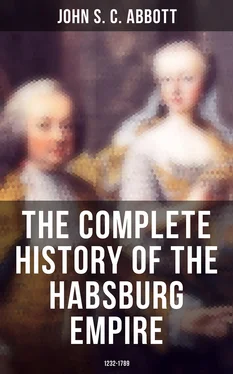Maximilian is justly considered one of the most renowned of the descendants of Rhodolph of Hapsburg. It is saying but little for his moral integrity, to affirm that he was one of the best of the rulers of his age. According to his ideas of religion, he was a religious man. According to his ideas of honesty and of honor, he was both an honest and an honorable man. According to his idea of what is called moral conduct , he was irreproachable, being addicted to no ungenteel vices, or any sins which would be condemned by his associates. His ambition was not to secure for himself ease or luxury, but to extend his imperial power, and to aggrandize his family. For these objects he passed his life, ever tossed upon the billows of toil and trouble. In industry and perseverance, he has rarely been surpassed.
Notwithstanding the innumerable interruptions and cares attendant upon his station, he still found time, one can hardly imagine when, to become a proficient in all the learning of the day. He wrote and spoke four languages readily, Latin, French, German and Italian. Few men have possessed more persuasive powers of eloquence. All the arts and sciences he warmly patronized, and men of letters of every class found in him a protector. But history must truthfully declare that there was no perfidy of which he would not be guilty, and no meanness to which he would not stoop, if he could only extend his hereditary domains and add to his family renown.
CHAPTER VII.
CHARLES V. AND THE REFORMATION.
From 1519 to 1531.
Table of Contents
Charles V. of Spain.—His Election as Emperor of Germany.—His Coronation.—The first Constitution.—Progress of the Reformation.—The Pope's Bull against Luther.—His Contempt for his Holiness.—The Diet at Worms.—Frederic's Objection to the Condemnation of Luther by the Diet.—He obtains for Luther the Right of Defense.—Luther's triumphal March to the Tribunal.—Charles urged to violate his Safe Conduct.—Luther's Patmos.—Marriage of Sister Catharine Bora to Luther.—Terrible Insurrection.—The Holy League.—The Protest of Spires.—Confession of Augsburg.—The two Confessions.—Compulsory Measures.
Charles V. of Spain, as the nearest male heir, inherited from Maximilian the Austrian States. He was the grandson of the late emperor, son of Philip and of Joanna, daughter of Ferdinand and Isabella, and was born on the 24th of February, 1500. He had been carefully educated in the learning and accomplishments of the age, and particularly in the arts of war. At the death of his grandfather, Ferdinand, Charles, though but sixteen years of age, assumed the title of King of Spain, and though strongly opposed for a time, he grasped firmly and held securely the reins of government.
Joanna, his mother, was legally the sovereign, both by the laws of united Castile and Arragon, and by the testaments of Isabella and Ferdinand. But she was insane, and was sunk in such depths of melancholy as to be almost unconscious of the scenes which were transpiring around her. Two years had elapsed between the accession of Charles V. to the throne of Spain and the death of his grandfather, Maximilian. The young king, with wonderful energy of character, had, during that time, established himself very firmly on the throne. Upon the death of Maximilian many claimants rose for the imperial throne. Henry VIII. of England and Francis of France, were prominent among the competitors. For six months all the arts of diplomacy were exhausted by the various candidates, and Charles of Spain won the prize. On the 28th of June, 1519, he was unanimously elected Emperor of Germany. The youthful sovereign, who was but nineteen years of age, was at Barcelona when he received the first intelligence of his election. He had sufficient strength of character to avoid the slightest appearance of exultation, but received the announcement with dignity and gravity far above his years.
The Spaniards were exceedingly excited and alarmed by the news. They feared that their young sovereign, of whom they had already begun to be proud, would leave Spain to establish his court in the German empire, and they should thus be left, as a distant province, to the government of a viceroy. The king was consequently flooded with petitions, from all parts of his dominions, not to accept the imperial crown. But Charles was as ambitious as his grandfather, Maximilian, whose foresight and maneuvering had set in train those influences which had elevated him to the imperial dignity.
Soon a solemn embassy arrived, and, with the customary pomp, proffered to Charles the crown which so many had coveted. Charles accepted the office, and made immediate preparations, notwithstanding the increasing clamor of his subjects, to go to Germany for his coronation. Intrusting the government of Spain during his absence to officers in whom he reposed confidence, he embarked on shipboard, and landing first at Dover in England, made a visit of four days to Henry VIII. He then continued his voyage to the Netherlands; proceeding thence to Aix-la-Chapelle, he was crowned on the 20th of October, 1520, with magnificence far surpassing that of any of his predecessors. Thus Charles V., when but twenty years of age, was the King of Spain and the crowned Emperor of Germany. It is a great mistake to suppose that youthful precocity is one of the innovations of modern times.
In the changes of the political kaleidoscope, Austria had now become a part of Spain, or rather a prince of Austrian descent, a lineal heir of the house of Hapsburg, had inherited the dominion of Spain, the most extensive monarchy, in its continental domains and its colonial possessions, then upon the globe. The Germanic confederation at this time made a decided step in advance. Hitherto the emperors, when crowned, had made a sort of verbal promise to administer the government in accordance with the laws and customs of the several states. They were, however, apprehensive that the new emperor, availing himself of the vast power which he possessed independently of the imperial crown, might, by gradual encroachments, defraud them of their rights. A sort of constitution was accordingly drawn up, consisting of thirty-six articles, defining quite minutely the laws, customs and privileges of the empire, which constitution Charles was required to sign before his coronation.
Charles presided in person over his first diet which he had convened at Worms on the 6th of January, 1521. The theological and political war of the Reformation was now agitating all Germany, and raging with the utmost violence. Luther had torn the vail from the corruptions of papacy, and was exhibiting to astonished Europe the enormous aggression and the unbridled licentiousness of pontifical power. Letter succeeded letter, and pamphlet pamphlet, and they fell upon the decaying hierarchy like shot and shell upon the walls of a fortress already crumbling and tottering through age.
On the 15th of July, 1520, three months before the coronation of Charles V., the pope issued his world-renowned bull against the intrepid monk. He condemned Luther as a heretic, forbade the reading of his writings, excommunicated him if he did not retract within sixty days, and all princes and states were commanded, under pain of incurring the same censure, to seize his person and punish him and his adherents. Many were overawed by these menaces of the holy father, who held the keys of heaven and of hell. The fate of Luther was considered sealed. His works were publicly burned in several cities.
Luther, undaunted, replied with blow for blow. He declared the pope to be antichrist, renounced all obedience to him, detailed with scathing severity the conduct of corrupt pontiffs, and called upon the whole nation to renounce all allegiance to the scandalous court of Rome. To cap the climax of his contempt and defiance, he, on the 10th of December, 1520, not two months after the crowning of Charles V., led his admiring followers, the professors and students of the university of Wittemberg, in procession to the eastern gate of the city, where, in the presence of a vast concourse, he committed the papal bull to the flames, exclaiming, in the words of Ezekiel, "Because thou hast troubled the Holy One of God, let eternal fire consume thee." This dauntless spirit of the reformer inspired his disciples throughout Germany with new courage, and in many other cities the pope's bull of excommunication was burned with expressions of indignation and contempt.
Читать дальше












